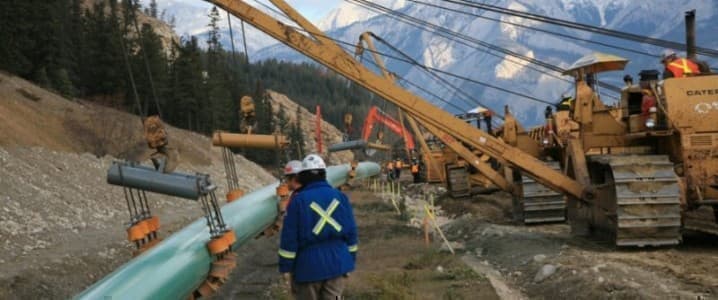Asian Market Buys First Oil Cargoes From Canada’s Trans Mountain Pipeline

China, Japan and South Korea are set to receive cargoes of oil imports from Canada’s newly expanded Trans Mountain pipeline in September, becoming the first Asian countries to benefit from the facility since it became operational in May.
The expanded TMX pipeline will triple the flow of crude from landlocked Alberta to Canada’s Pacific coast to 890,000 barrels per day (bpd). TMX provides Asian refiners an opportunity to diversify their imports while also giving Canadian producers more access to U.S. West Coast and Asian markets.
South Korean refiner GS Caltex will split a 550,000-barrel Cold Lake crude cargo with Japan’s top refiner ENEOS, with GS Caltex taking 300,000 barrels while ENEOS will get 250,000 barrels. South Korea’s top refiner SK Energy, a unit of SK Innovation, bought a 550,00-barrel cargo from Unipec while Hengyi Petrochemical, a refinery operator in Brunei, also purchased a similar volume of crude from PetroChina Co (OTCPK:PCCYF). All the cargoes were sold at discounts of between $5 and $6 a barrel to ICE Brent.
Meanwhile, Chinese private refiner Rongsheng Petrochemical has purchased two Canadian Access Western Blend (AWB) crude cargoes from ConocoPhillips (NYSE:COP) and Vitol on top of another two AWB cargoes it bought via a tender. Cold Lake and AWB are heavy sour crude containing 3.5-4% sulfur and with API gravity of 21-22 degrees.
TMX crude exports are expected to clock in at ~350,000-400,000 bpd, and will compete with heavy grades from Latin America and the Middle East. According to Muyu Xu, a senior crude oil analyst at analytics firm Kpler, Cold Lake crude is about $10 per barrel cheaper than Iraq’s Basra Heavy for deliveries to China.
“Canada’s TMX crude attracts interest from Asian buyers who are keen to secure cheap supplies of heavy grades but do not have access to U.S.-sanctioned Venezuelan crude,” XU told Reuters. “It will still take some time for refiners to experiment with and test TMX crude as the first few cargoes have just arrived,” she added.
By Alex Kimani for Oilprice.com
More Top Reads From Oilprice.com
This article was originally published by a oilprice.com
Read it HERE






